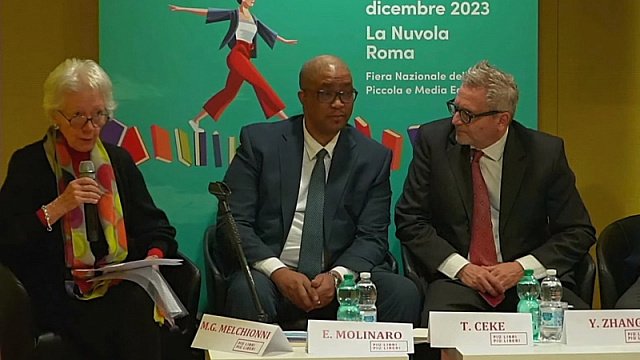11.12.23
16:16
Italy publishes a book on international co-operation within the BRICS framework
The book launch was attended by representatives of the South African and Chinese embassies in Italy
The book “II Coordinamento BRICS. Brazil, Russia, India, China, South Africa on the Global Scene. Constitution, Evolution, Prospects of a New Model of International Cooperation), published in Italy by Armando Editore, one of the oldest publishers of scientific and educational literature in Rome was presented in Italy, at the national fair of medium and small publishers Più Libri – Più Liberi.
The idea of this book is to answer the question of what BRICS coordination really is. For this purpose, within the framework of the special laboratory on BRICS promoted since 2015 by the Eurispes, Institute for Political, Economic and Social Studies, a group of qualified experts prepared studies on the BRICS countries that formed the basis of the book.
Its authors are Elisabetta Basile, Marta Bono, Claudio Cecchi, Roberta Ciampo, Paolo Motta, Francesco Petrone, Christin Pfeiffer, Paolo Raimondi, Marco Ricceri, Georgy Toloraya, Galina Panova and Irina Yarigina.
Political Counselor of the South African Embassy to Italy, Teddy Ceke, Political Counselor of the China Embassy to Italy, Yanyu Zhang, President of the Institute for Political, Economic and Social Research (Rome) Eurispes, Gian Maria Fara, Coordinator of Eurispes BRICS-LAB and other dignitaries.
“Upholding the spirit of openness, inclusiveness and win-win cooperation, BRICS countries are committed to working for a multipolar world, and their role of being a positive and stable force in international affairs is increasingly prominent. Against such a backdrop, an increasing number of developing countries are lining up, knocking on the door of the BRICS and applying to join, which fully reflects the strong appeal and influence of BRICS cooperation,” said Yanyu Zhang, Political Counsellor of the Chinese Embassy in Italy.
“As South Africa, we believe in the continued value of BRICS as a partnership of leading emerging markets and developing countries providing leadership and a momentum towards global growth, sustainable development and inclusion of the global South in the world system of governance. We also believe in a mutually beneficial partnership between BRICS and Africa, as equal partners, that is featured prominently in our BRICS engagements,” said Teddy Ceke, Political Counselor of the South African Embassy to Italy.
An expert from Italy, President of the Institute Eurispes Gian Maria Fara emphasises the importance of the contribution of the academic community, including the Italian one, in correctly assessing the transformational processes taking place on the international scene.
“The book on BRICS, published by Armando Editore, provides the reader with cognitive elements on the main characteristics, strategies, policies, plans and programs of this important coordination promoted between primary States that are different in history, culture, economy and even not geographically contiguous. In this situation it is important to contribute to promoting practices of positive comparison with coordination such as that of the BRICS, and to build possible cooperative relationships to satisfy, in transparency, the mutual needs and interests,” said Gian Maria Fara.
Galina Panova, Professor at Moscow State Institute of International Relations (MGIMO), told how the work on the book was conducted.
“I can assure you that it was both pleasant and easy for me to work with such a distinguished, professional author team. The members of the author’s team are highly professional scholars and practitioners who have been researching the most pressing issues of BRICS development for many years and understand the paramount importance of the issues raised in the book, which require unambiguous solutions in the near and distant future. Even an unsophisticated reader cannot fail to note the authors’ comprehensive, in-depth approach to analysing the most important issues of development and improvement of mutually beneficial cooperation between the BRICS countries,” she noted.
“The most general look at the content of the book allows us to judge the level of issues raised in it. These include a new model of international cooperation; the diversity of interests of the BRICS countries; the evolution of the BRICS on the way to a new international order; the issues of formation of a new monetary system of the BRICS countries. The BRICS contribution to the stability of financial markets is considered, including an assessment of the functioning of the New Development Bank, the current state and prospects of the payment system, new trends in the banking sector of the BRICS countries; the role of the New Development Bank in the dynamics of global development; the BRICS dispute resolution centres; and the role of the BRICS in urban development; civil society; issues of multilateralism and economic cooperation. <…> Undoubtedly, the new book opens new horizons for the development of mutually beneficial cooperation between the BRICS countries and the formation of a multipolar world,” summarised Galina Panova.
It should be noted that the decision taken in August 2023 at the annual BRICS summit chaired by South Africa to expand coordination to include six new members aroused great interest, especially in the international press. The possible future impact of the association on the world order is widely discussed by experts.
Photo: book presentation
Back

